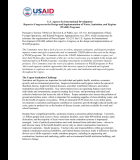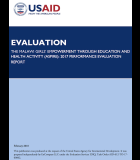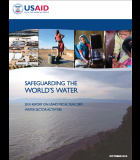Strengthening Health Outcomes through the Private Sector (SHOPS)
The SHOPS project was designed to enhance the effectiveness of the private sector as a sustainable approach to providing quality health services, especially in the critical areas of family planning and reproductive health, MCH, and HIV and AIDS. Other areas of focus included infectious disease; water, sanitation, and hygiene (WASH); and environmental health. By engaging and supporting the growing private health sector in developing countries, as a complement to public sector health services, the project aimed to improve both the availability and the quality of critical health services.
Demonstrated results include measurable increases in knowledge, supply, and use of family planning, MCH, and HIV and AIDS services; improved conditions for private sector involvement; and greater sustainability of health outcomes.
Activity Description
Many rural areas in Malawi struggle to maintain access to safe drinking water, where communities rely on boreholes, shallow hand-dug wells, and surface water, and are far from stores that sell water treatment products. To increase access and use of water treatment products, SHOPS tested four models for promoting chlorine-based water treatment products, including free distribution, water hygiene kits, commercial sales, and community-based sales. SHOPS found that the product WaterGuard, marketed by PSI since 2003, was most popular, well-regarded, and easiest to use. To promote household use, SHOPS aired WaterGuard promotional messages on two national radio advertisements that reminded consumers of the importance of treating drinking water.
SHOPS also supported Evidence Action in piloting the Dispensers for Safe Water (DSW) project, which installed communal chlorine dispensers that reduced chlorine costs through bulk purchasing and increasing use through social pressure. SHOPS assisted the DSW project with installing 50 dispensers in the district of Zomba, encouraging community members to use the dispensers, and monitoring the usage rate. To ensure the DSW project’s sustainability in Malawi, SHOPS worked with Evidence Action to replicate a new carbon credit financing mechanism and pilot newly designed solid chlorine dispensers.
Expected Outcomes
- Improve the enabling environment for the private sector to ensure improved access to quality health care services.
- Strengthen the capacity of nonprofit health facilities to deliver priority services in a sustainable manner.
- Expand the role of the commercial providers in delivering priority health services.
- Increase the demand for diarrhea prevention and treatment products and services.
Actual Outcomes
- Over the course of the program, the average total chlorine rates—indicating the use of chlorine—increased from 68 percent to 90 percent. The average free chlorine—indicating proper chlorine treatment—increased from 51 percent to 73 percent.
- Usage levels far exceed the baseline self-reported use of chlorine at 27 percent.
- The solid chlorine dispenser pilot demonstrated that switching to solid chlorine could reduce distribution costs by a factor of 10 and reduce refilling frequency from every two weeks to every six months.
- 338 people had gained access to improved sanitation.
- The SHOPS project distributed 8,650 posters and brochures to the trained masons and hosted more than 30 community events to enable them to scale up their marketing efforts.




